Artificial Intelligence: Impact on Product Design and Manufacturing
VerifiedAdded on 2020/06/04
|14
|5320
|197
Essay
AI Summary
This essay delves into the multifaceted impact of Artificial Intelligence (AI) on product design, market introduction, and manufacturing functions. It begins by defining AI and its evolution, emphasizing its role in the fourth industrial revolution. The essay then analyzes how AI techniques are transforming product engineering, offering examples of AI's contribution to car design, mobile phone development, and automated manufacturing processes. It highlights the benefits of AI in compressing product development cycles, improving efficiency, and reducing costs. Furthermore, the essay explores AI's role in product analysis, risk assessment, and market strategies. While acknowledging the positive impacts of AI on innovation and productivity, the essay also addresses potential negative consequences, such as job displacement. The essay also examines how AI is redefining management roles within organizations. The essay concludes by emphasizing the need for managers to focus on human judgment, empathy, and ethical considerations, while leveraging AI for administrative tasks. This essay provides a comprehensive overview of AI's transformative influence across various sectors and its implications for the future of work and consumerism.
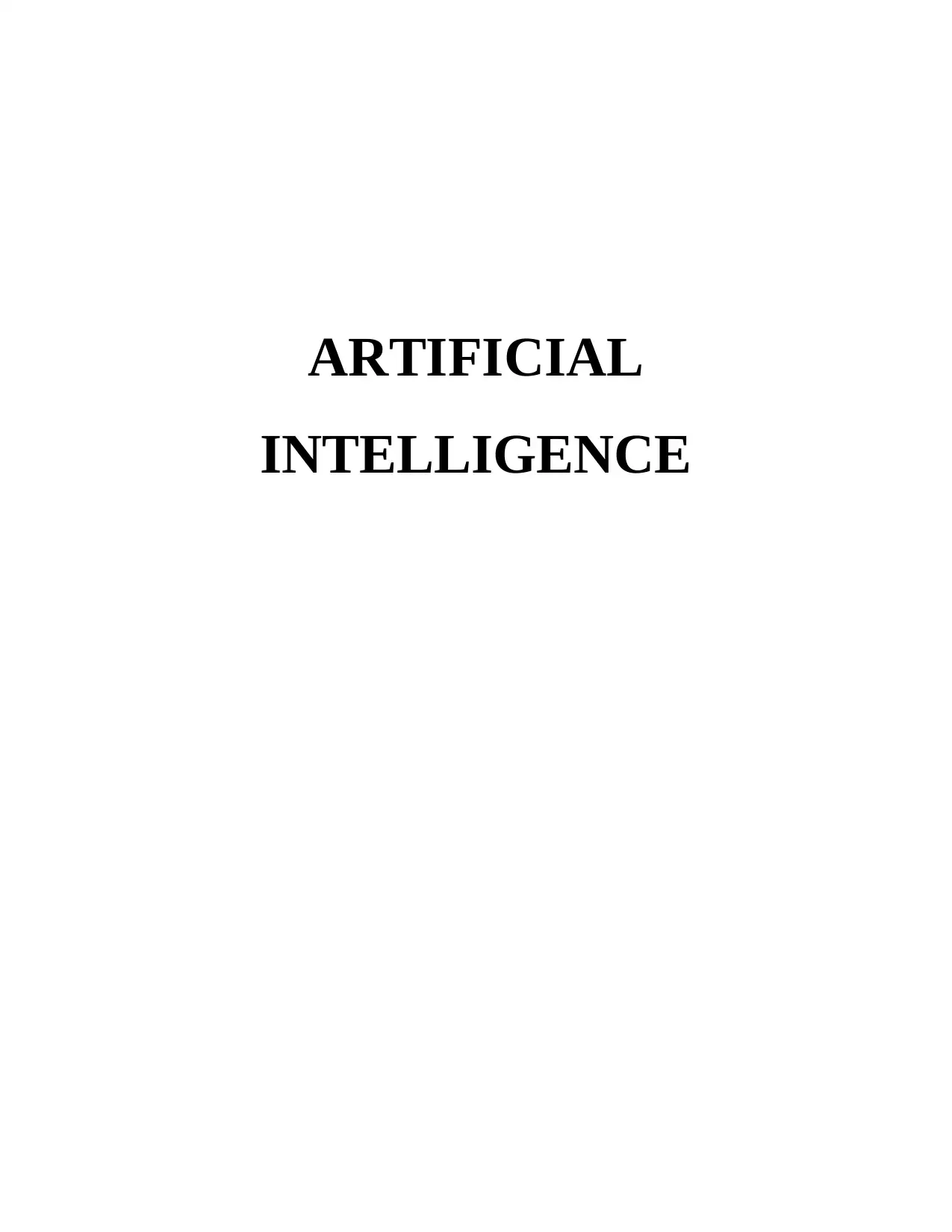
ARTIFICIAL
INTELLIGENCE
INTELLIGENCE
Paraphrase This Document
Need a fresh take? Get an instant paraphrase of this document with our AI Paraphraser
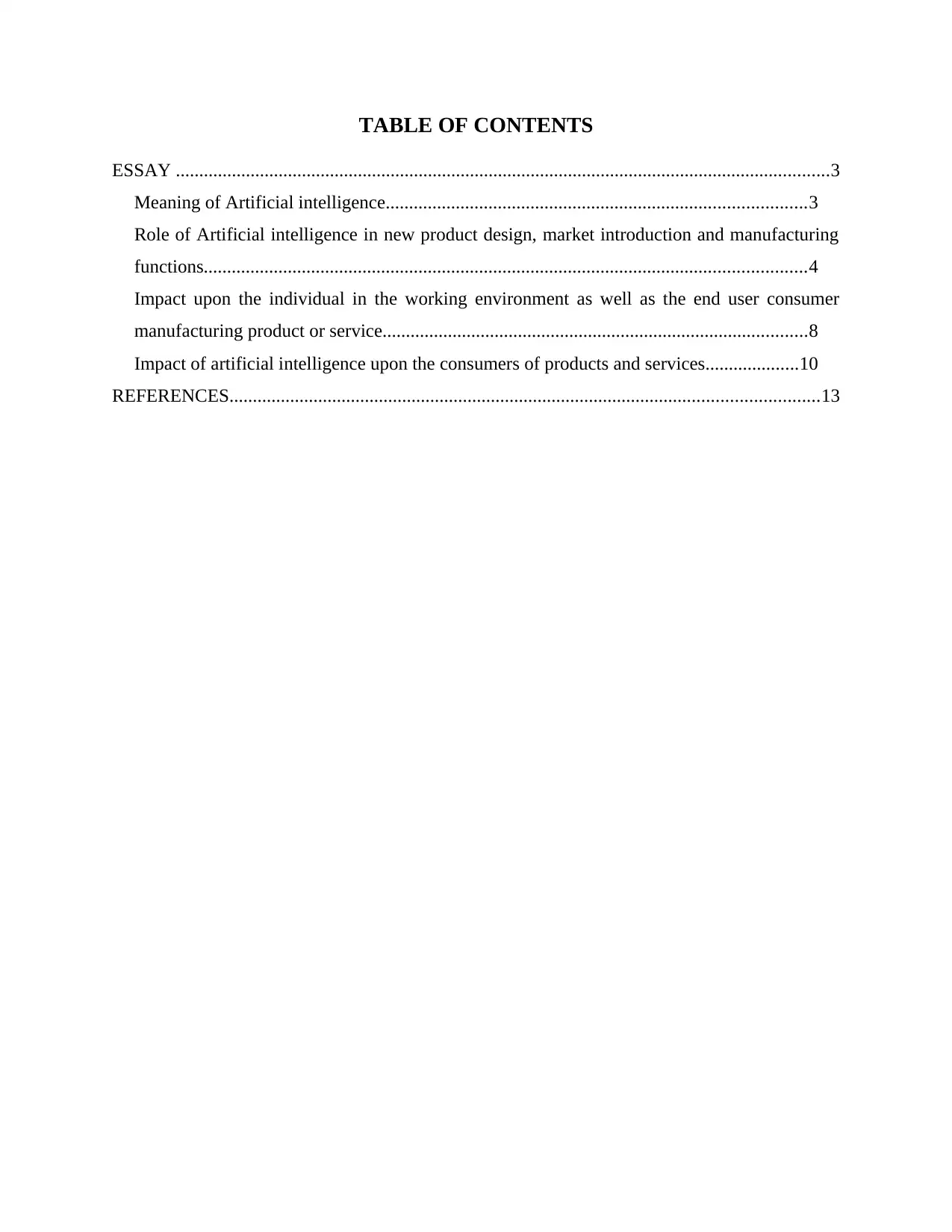
TABLE OF CONTENTS
ESSAY ............................................................................................................................................3
Meaning of Artificial intelligence..........................................................................................3
Role of Artificial intelligence in new product design, market introduction and manufacturing
functions.................................................................................................................................4
Impact upon the individual in the working environment as well as the end user consumer
manufacturing product or service...........................................................................................8
Impact of artificial intelligence upon the consumers of products and services....................10
REFERENCES..............................................................................................................................13
ESSAY ............................................................................................................................................3
Meaning of Artificial intelligence..........................................................................................3
Role of Artificial intelligence in new product design, market introduction and manufacturing
functions.................................................................................................................................4
Impact upon the individual in the working environment as well as the end user consumer
manufacturing product or service...........................................................................................8
Impact of artificial intelligence upon the consumers of products and services....................10
REFERENCES..............................................................................................................................13
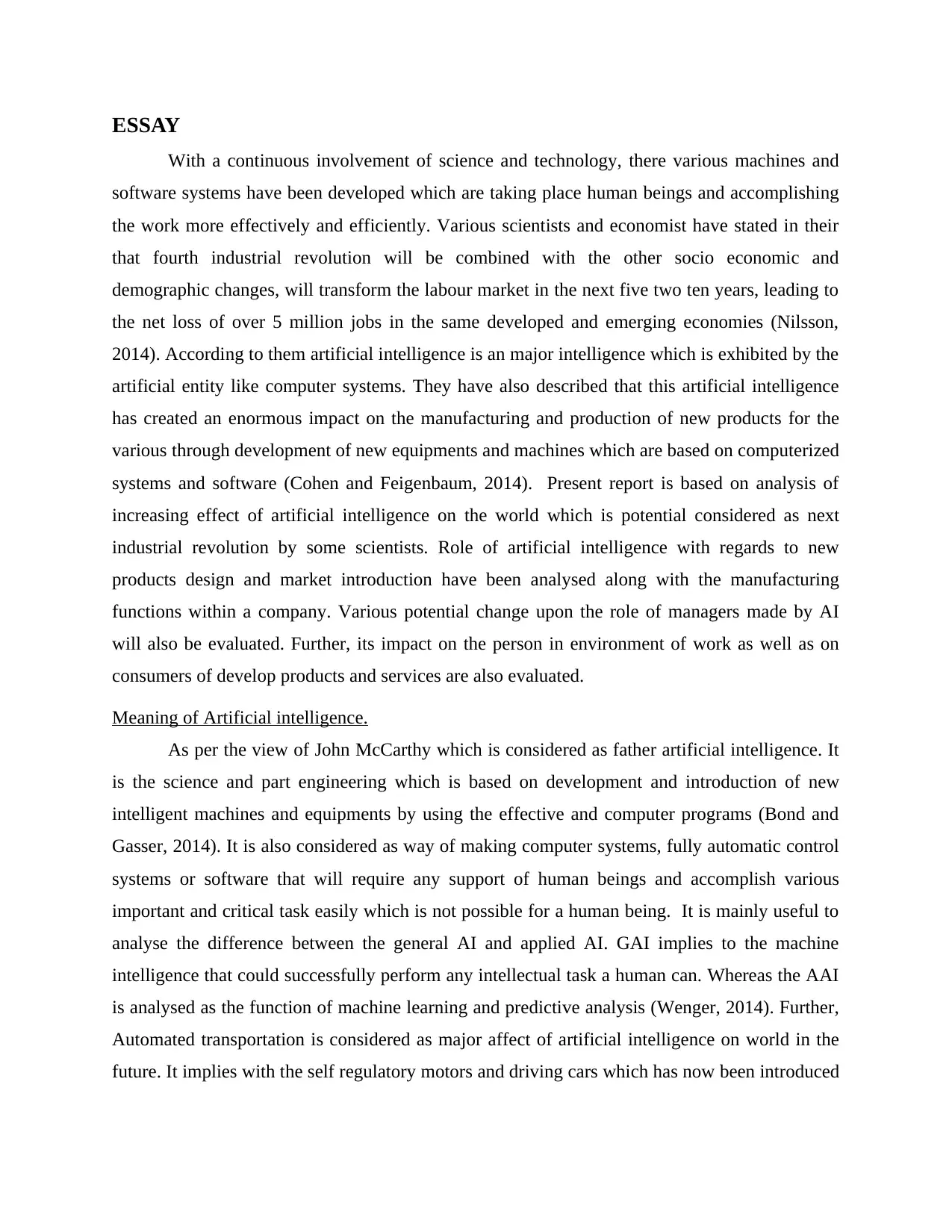
ESSAY
With a continuous involvement of science and technology, there various machines and
software systems have been developed which are taking place human beings and accomplishing
the work more effectively and efficiently. Various scientists and economist have stated in their
that fourth industrial revolution will be combined with the other socio economic and
demographic changes, will transform the labour market in the next five two ten years, leading to
the net loss of over 5 million jobs in the same developed and emerging economies (Nilsson,
2014). According to them artificial intelligence is an major intelligence which is exhibited by the
artificial entity like computer systems. They have also described that this artificial intelligence
has created an enormous impact on the manufacturing and production of new products for the
various through development of new equipments and machines which are based on computerized
systems and software (Cohen and Feigenbaum, 2014). Present report is based on analysis of
increasing effect of artificial intelligence on the world which is potential considered as next
industrial revolution by some scientists. Role of artificial intelligence with regards to new
products design and market introduction have been analysed along with the manufacturing
functions within a company. Various potential change upon the role of managers made by AI
will also be evaluated. Further, its impact on the person in environment of work as well as on
consumers of develop products and services are also evaluated.
Meaning of Artificial intelligence.
As per the view of John McCarthy which is considered as father artificial intelligence. It
is the science and part engineering which is based on development and introduction of new
intelligent machines and equipments by using the effective and computer programs (Bond and
Gasser, 2014). It is also considered as way of making computer systems, fully automatic control
systems or software that will require any support of human beings and accomplish various
important and critical task easily which is not possible for a human being. It is mainly useful to
analyse the difference between the general AI and applied AI. GAI implies to the machine
intelligence that could successfully perform any intellectual task a human can. Whereas the AAI
is analysed as the function of machine learning and predictive analysis (Wenger, 2014). Further,
Automated transportation is considered as major affect of artificial intelligence on world in the
future. It implies with the self regulatory motors and driving cars which has now been introduced
With a continuous involvement of science and technology, there various machines and
software systems have been developed which are taking place human beings and accomplishing
the work more effectively and efficiently. Various scientists and economist have stated in their
that fourth industrial revolution will be combined with the other socio economic and
demographic changes, will transform the labour market in the next five two ten years, leading to
the net loss of over 5 million jobs in the same developed and emerging economies (Nilsson,
2014). According to them artificial intelligence is an major intelligence which is exhibited by the
artificial entity like computer systems. They have also described that this artificial intelligence
has created an enormous impact on the manufacturing and production of new products for the
various through development of new equipments and machines which are based on computerized
systems and software (Cohen and Feigenbaum, 2014). Present report is based on analysis of
increasing effect of artificial intelligence on the world which is potential considered as next
industrial revolution by some scientists. Role of artificial intelligence with regards to new
products design and market introduction have been analysed along with the manufacturing
functions within a company. Various potential change upon the role of managers made by AI
will also be evaluated. Further, its impact on the person in environment of work as well as on
consumers of develop products and services are also evaluated.
Meaning of Artificial intelligence.
As per the view of John McCarthy which is considered as father artificial intelligence. It
is the science and part engineering which is based on development and introduction of new
intelligent machines and equipments by using the effective and computer programs (Bond and
Gasser, 2014). It is also considered as way of making computer systems, fully automatic control
systems or software that will require any support of human beings and accomplish various
important and critical task easily which is not possible for a human being. It is mainly useful to
analyse the difference between the general AI and applied AI. GAI implies to the machine
intelligence that could successfully perform any intellectual task a human can. Whereas the AAI
is analysed as the function of machine learning and predictive analysis (Wenger, 2014). Further,
Automated transportation is considered as major affect of artificial intelligence on world in the
future. It implies with the self regulatory motors and driving cars which has now been introduced
⊘ This is a preview!⊘
Do you want full access?
Subscribe today to unlock all pages.

Trusted by 1+ million students worldwide
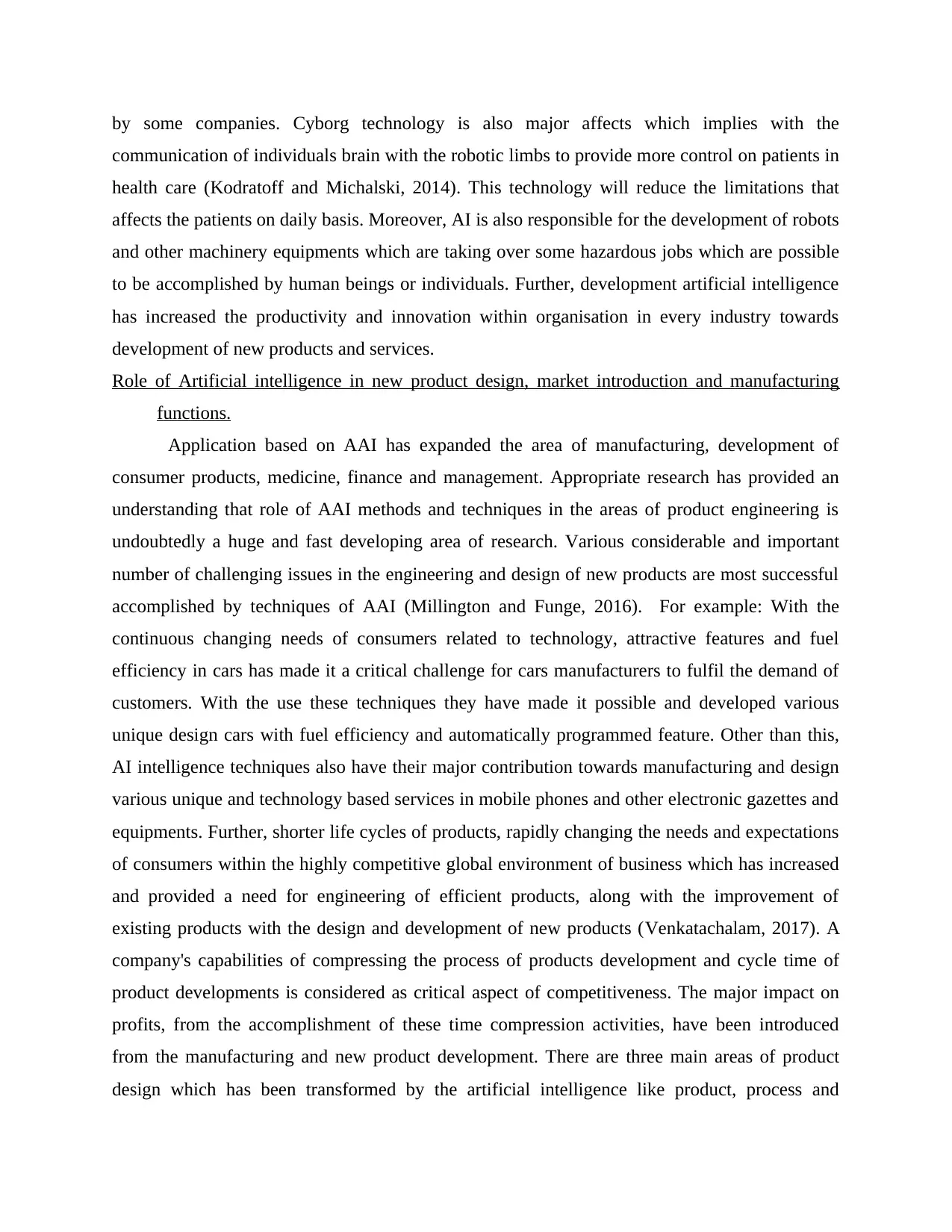
by some companies. Cyborg technology is also major affects which implies with the
communication of individuals brain with the robotic limbs to provide more control on patients in
health care (Kodratoff and Michalski, 2014). This technology will reduce the limitations that
affects the patients on daily basis. Moreover, AI is also responsible for the development of robots
and other machinery equipments which are taking over some hazardous jobs which are possible
to be accomplished by human beings or individuals. Further, development artificial intelligence
has increased the productivity and innovation within organisation in every industry towards
development of new products and services.
Role of Artificial intelligence in new product design, market introduction and manufacturing
functions.
Application based on AAI has expanded the area of manufacturing, development of
consumer products, medicine, finance and management. Appropriate research has provided an
understanding that role of AAI methods and techniques in the areas of product engineering is
undoubtedly a huge and fast developing area of research. Various considerable and important
number of challenging issues in the engineering and design of new products are most successful
accomplished by techniques of AAI (Millington and Funge, 2016). For example: With the
continuous changing needs of consumers related to technology, attractive features and fuel
efficiency in cars has made it a critical challenge for cars manufacturers to fulfil the demand of
customers. With the use these techniques they have made it possible and developed various
unique design cars with fuel efficiency and automatically programmed feature. Other than this,
AI intelligence techniques also have their major contribution towards manufacturing and design
various unique and technology based services in mobile phones and other electronic gazettes and
equipments. Further, shorter life cycles of products, rapidly changing the needs and expectations
of consumers within the highly competitive global environment of business which has increased
and provided a need for engineering of efficient products, along with the improvement of
existing products with the design and development of new products (Venkatachalam, 2017). A
company's capabilities of compressing the process of products development and cycle time of
product developments is considered as critical aspect of competitiveness. The major impact on
profits, from the accomplishment of these time compression activities, have been introduced
from the manufacturing and new product development. There are three main areas of product
design which has been transformed by the artificial intelligence like product, process and
communication of individuals brain with the robotic limbs to provide more control on patients in
health care (Kodratoff and Michalski, 2014). This technology will reduce the limitations that
affects the patients on daily basis. Moreover, AI is also responsible for the development of robots
and other machinery equipments which are taking over some hazardous jobs which are possible
to be accomplished by human beings or individuals. Further, development artificial intelligence
has increased the productivity and innovation within organisation in every industry towards
development of new products and services.
Role of Artificial intelligence in new product design, market introduction and manufacturing
functions.
Application based on AAI has expanded the area of manufacturing, development of
consumer products, medicine, finance and management. Appropriate research has provided an
understanding that role of AAI methods and techniques in the areas of product engineering is
undoubtedly a huge and fast developing area of research. Various considerable and important
number of challenging issues in the engineering and design of new products are most successful
accomplished by techniques of AAI (Millington and Funge, 2016). For example: With the
continuous changing needs of consumers related to technology, attractive features and fuel
efficiency in cars has made it a critical challenge for cars manufacturers to fulfil the demand of
customers. With the use these techniques they have made it possible and developed various
unique design cars with fuel efficiency and automatically programmed feature. Other than this,
AI intelligence techniques also have their major contribution towards manufacturing and design
various unique and technology based services in mobile phones and other electronic gazettes and
equipments. Further, shorter life cycles of products, rapidly changing the needs and expectations
of consumers within the highly competitive global environment of business which has increased
and provided a need for engineering of efficient products, along with the improvement of
existing products with the design and development of new products (Venkatachalam, 2017). A
company's capabilities of compressing the process of products development and cycle time of
product developments is considered as critical aspect of competitiveness. The major impact on
profits, from the accomplishment of these time compression activities, have been introduced
from the manufacturing and new product development. There are three main areas of product
design which has been transformed by the artificial intelligence like product, process and
Paraphrase This Document
Need a fresh take? Get an instant paraphrase of this document with our AI Paraphraser
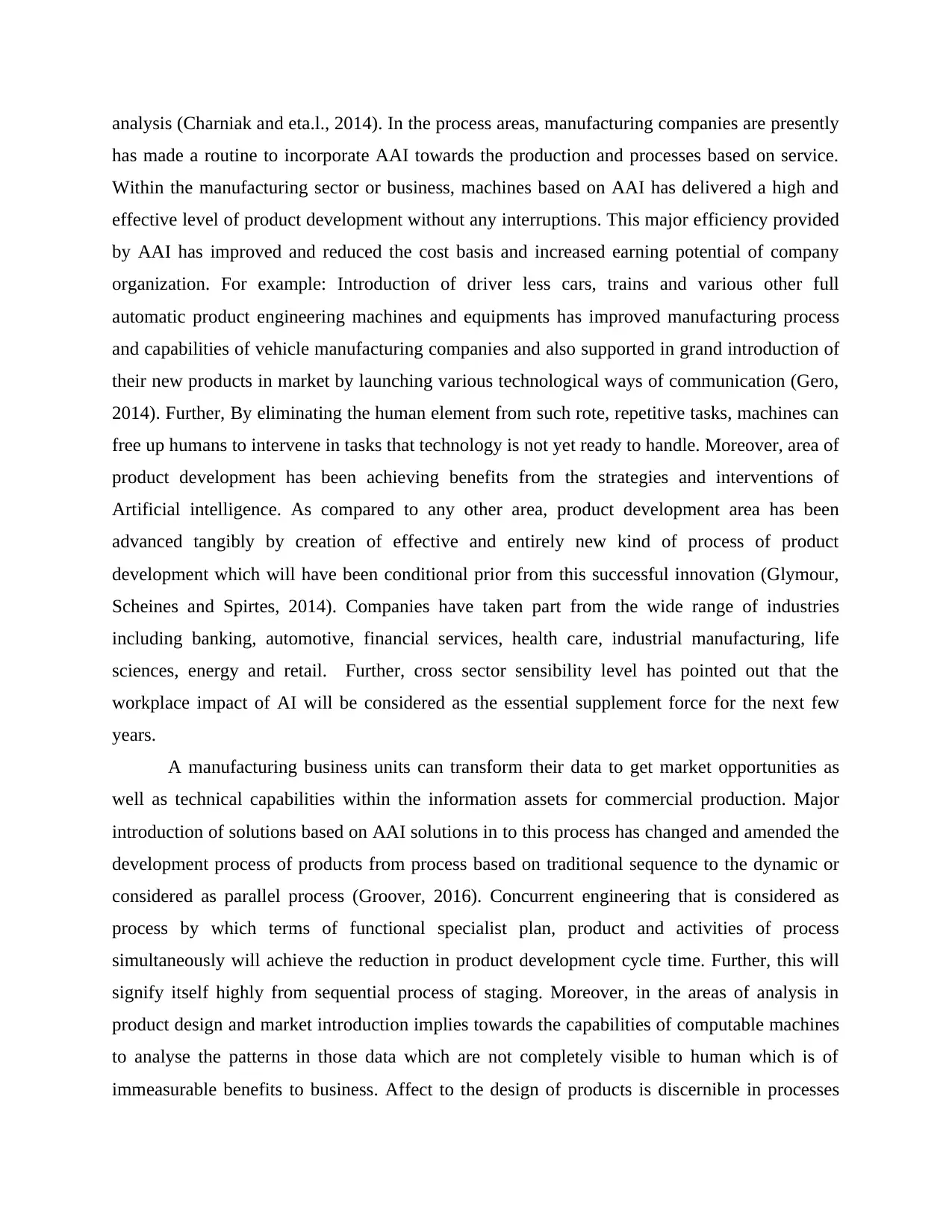
analysis (Charniak and eta.l., 2014). In the process areas, manufacturing companies are presently
has made a routine to incorporate AAI towards the production and processes based on service.
Within the manufacturing sector or business, machines based on AAI has delivered a high and
effective level of product development without any interruptions. This major efficiency provided
by AAI has improved and reduced the cost basis and increased earning potential of company
organization. For example: Introduction of driver less cars, trains and various other full
automatic product engineering machines and equipments has improved manufacturing process
and capabilities of vehicle manufacturing companies and also supported in grand introduction of
their new products in market by launching various technological ways of communication (Gero,
2014). Further, By eliminating the human element from such rote, repetitive tasks, machines can
free up humans to intervene in tasks that technology is not yet ready to handle. Moreover, area of
product development has been achieving benefits from the strategies and interventions of
Artificial intelligence. As compared to any other area, product development area has been
advanced tangibly by creation of effective and entirely new kind of process of product
development which will have been conditional prior from this successful innovation (Glymour,
Scheines and Spirtes, 2014). Companies have taken part from the wide range of industries
including banking, automotive, financial services, health care, industrial manufacturing, life
sciences, energy and retail. Further, cross sector sensibility level has pointed out that the
workplace impact of AI will be considered as the essential supplement force for the next few
years.
A manufacturing business units can transform their data to get market opportunities as
well as technical capabilities within the information assets for commercial production. Major
introduction of solutions based on AAI solutions in to this process has changed and amended the
development process of products from process based on traditional sequence to the dynamic or
considered as parallel process (Groover, 2016). Concurrent engineering that is considered as
process by which terms of functional specialist plan, product and activities of process
simultaneously will achieve the reduction in product development cycle time. Further, this will
signify itself highly from sequential process of staging. Moreover, in the areas of analysis in
product design and market introduction implies towards the capabilities of computable machines
to analyse the patterns in those data which are not completely visible to human which is of
immeasurable benefits to business. Affect to the design of products is discernible in processes
has made a routine to incorporate AAI towards the production and processes based on service.
Within the manufacturing sector or business, machines based on AAI has delivered a high and
effective level of product development without any interruptions. This major efficiency provided
by AAI has improved and reduced the cost basis and increased earning potential of company
organization. For example: Introduction of driver less cars, trains and various other full
automatic product engineering machines and equipments has improved manufacturing process
and capabilities of vehicle manufacturing companies and also supported in grand introduction of
their new products in market by launching various technological ways of communication (Gero,
2014). Further, By eliminating the human element from such rote, repetitive tasks, machines can
free up humans to intervene in tasks that technology is not yet ready to handle. Moreover, area of
product development has been achieving benefits from the strategies and interventions of
Artificial intelligence. As compared to any other area, product development area has been
advanced tangibly by creation of effective and entirely new kind of process of product
development which will have been conditional prior from this successful innovation (Glymour,
Scheines and Spirtes, 2014). Companies have taken part from the wide range of industries
including banking, automotive, financial services, health care, industrial manufacturing, life
sciences, energy and retail. Further, cross sector sensibility level has pointed out that the
workplace impact of AI will be considered as the essential supplement force for the next few
years.
A manufacturing business units can transform their data to get market opportunities as
well as technical capabilities within the information assets for commercial production. Major
introduction of solutions based on AAI solutions in to this process has changed and amended the
development process of products from process based on traditional sequence to the dynamic or
considered as parallel process (Groover, 2016). Concurrent engineering that is considered as
process by which terms of functional specialist plan, product and activities of process
simultaneously will achieve the reduction in product development cycle time. Further, this will
signify itself highly from sequential process of staging. Moreover, in the areas of analysis in
product design and market introduction implies towards the capabilities of computable machines
to analyse the patterns in those data which are not completely visible to human which is of
immeasurable benefits to business. Affect to the design of products is discernible in processes
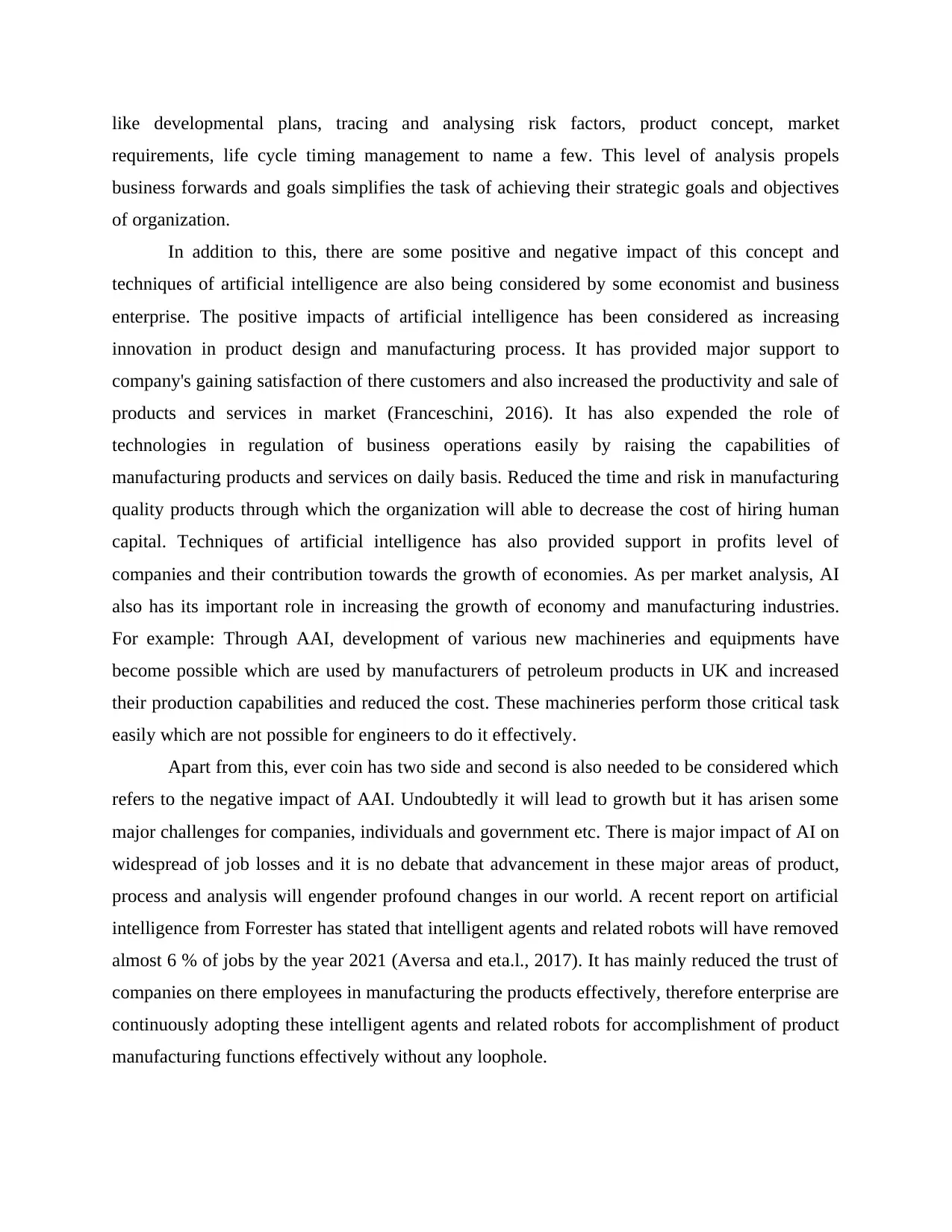
like developmental plans, tracing and analysing risk factors, product concept, market
requirements, life cycle timing management to name a few. This level of analysis propels
business forwards and goals simplifies the task of achieving their strategic goals and objectives
of organization.
In addition to this, there are some positive and negative impact of this concept and
techniques of artificial intelligence are also being considered by some economist and business
enterprise. The positive impacts of artificial intelligence has been considered as increasing
innovation in product design and manufacturing process. It has provided major support to
company's gaining satisfaction of there customers and also increased the productivity and sale of
products and services in market (Franceschini, 2016). It has also expended the role of
technologies in regulation of business operations easily by raising the capabilities of
manufacturing products and services on daily basis. Reduced the time and risk in manufacturing
quality products through which the organization will able to decrease the cost of hiring human
capital. Techniques of artificial intelligence has also provided support in profits level of
companies and their contribution towards the growth of economies. As per market analysis, AI
also has its important role in increasing the growth of economy and manufacturing industries.
For example: Through AAI, development of various new machineries and equipments have
become possible which are used by manufacturers of petroleum products in UK and increased
their production capabilities and reduced the cost. These machineries perform those critical task
easily which are not possible for engineers to do it effectively.
Apart from this, ever coin has two side and second is also needed to be considered which
refers to the negative impact of AAI. Undoubtedly it will lead to growth but it has arisen some
major challenges for companies, individuals and government etc. There is major impact of AI on
widespread of job losses and it is no debate that advancement in these major areas of product,
process and analysis will engender profound changes in our world. A recent report on artificial
intelligence from Forrester has stated that intelligent agents and related robots will have removed
almost 6 % of jobs by the year 2021 (Aversa and eta.l., 2017). It has mainly reduced the trust of
companies on there employees in manufacturing the products effectively, therefore enterprise are
continuously adopting these intelligent agents and related robots for accomplishment of product
manufacturing functions effectively without any loophole.
requirements, life cycle timing management to name a few. This level of analysis propels
business forwards and goals simplifies the task of achieving their strategic goals and objectives
of organization.
In addition to this, there are some positive and negative impact of this concept and
techniques of artificial intelligence are also being considered by some economist and business
enterprise. The positive impacts of artificial intelligence has been considered as increasing
innovation in product design and manufacturing process. It has provided major support to
company's gaining satisfaction of there customers and also increased the productivity and sale of
products and services in market (Franceschini, 2016). It has also expended the role of
technologies in regulation of business operations easily by raising the capabilities of
manufacturing products and services on daily basis. Reduced the time and risk in manufacturing
quality products through which the organization will able to decrease the cost of hiring human
capital. Techniques of artificial intelligence has also provided support in profits level of
companies and their contribution towards the growth of economies. As per market analysis, AI
also has its important role in increasing the growth of economy and manufacturing industries.
For example: Through AAI, development of various new machineries and equipments have
become possible which are used by manufacturers of petroleum products in UK and increased
their production capabilities and reduced the cost. These machineries perform those critical task
easily which are not possible for engineers to do it effectively.
Apart from this, ever coin has two side and second is also needed to be considered which
refers to the negative impact of AAI. Undoubtedly it will lead to growth but it has arisen some
major challenges for companies, individuals and government etc. There is major impact of AI on
widespread of job losses and it is no debate that advancement in these major areas of product,
process and analysis will engender profound changes in our world. A recent report on artificial
intelligence from Forrester has stated that intelligent agents and related robots will have removed
almost 6 % of jobs by the year 2021 (Aversa and eta.l., 2017). It has mainly reduced the trust of
companies on there employees in manufacturing the products effectively, therefore enterprise are
continuously adopting these intelligent agents and related robots for accomplishment of product
manufacturing functions effectively without any loophole.
⊘ This is a preview!⊘
Do you want full access?
Subscribe today to unlock all pages.

Trusted by 1+ million students worldwide
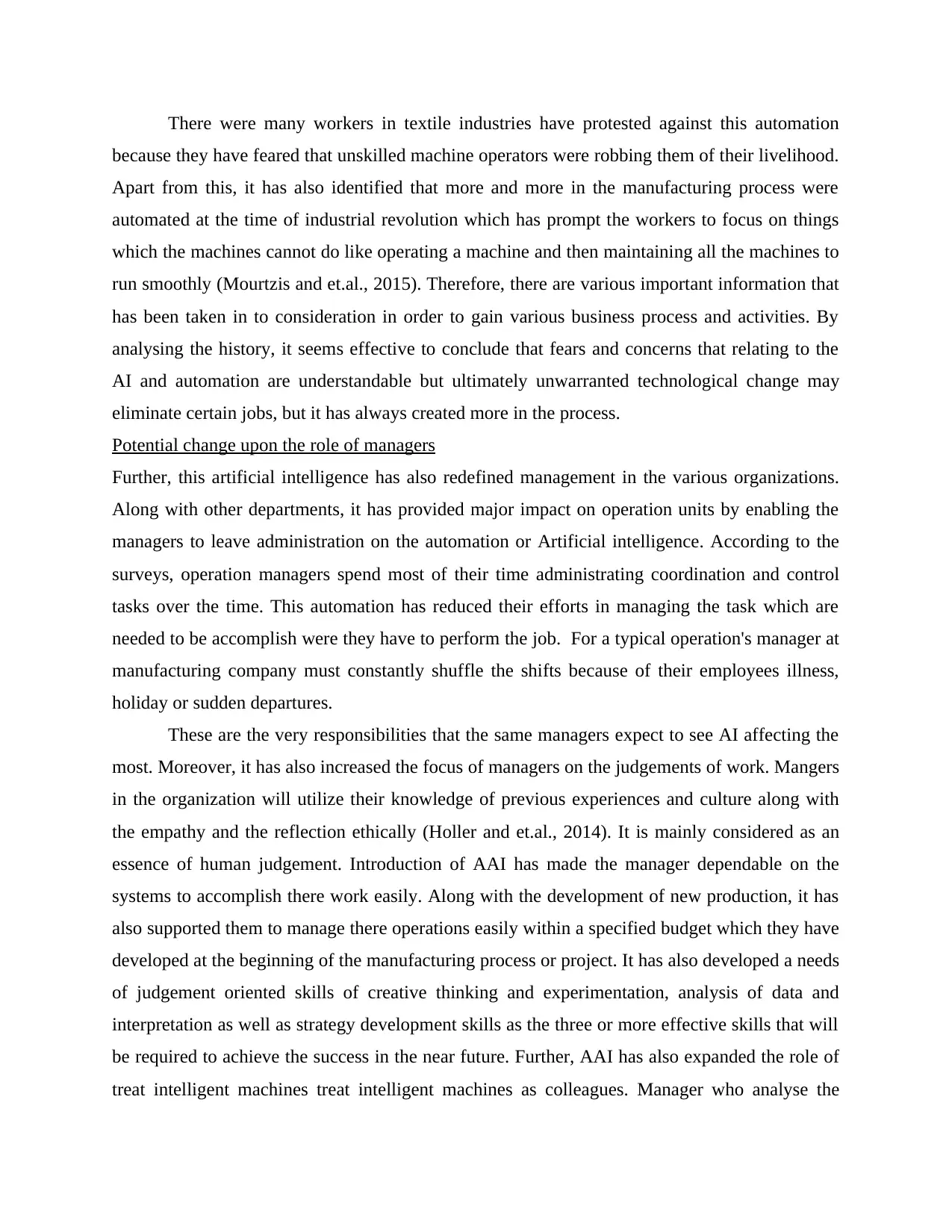
There were many workers in textile industries have protested against this automation
because they have feared that unskilled machine operators were robbing them of their livelihood.
Apart from this, it has also identified that more and more in the manufacturing process were
automated at the time of industrial revolution which has prompt the workers to focus on things
which the machines cannot do like operating a machine and then maintaining all the machines to
run smoothly (Mourtzis and et.al., 2015). Therefore, there are various important information that
has been taken in to consideration in order to gain various business process and activities. By
analysing the history, it seems effective to conclude that fears and concerns that relating to the
AI and automation are understandable but ultimately unwarranted technological change may
eliminate certain jobs, but it has always created more in the process.
Potential change upon the role of managers
Further, this artificial intelligence has also redefined management in the various organizations.
Along with other departments, it has provided major impact on operation units by enabling the
managers to leave administration on the automation or Artificial intelligence. According to the
surveys, operation managers spend most of their time administrating coordination and control
tasks over the time. This automation has reduced their efforts in managing the task which are
needed to be accomplish were they have to perform the job. For a typical operation's manager at
manufacturing company must constantly shuffle the shifts because of their employees illness,
holiday or sudden departures.
These are the very responsibilities that the same managers expect to see AI affecting the
most. Moreover, it has also increased the focus of managers on the judgements of work. Mangers
in the organization will utilize their knowledge of previous experiences and culture along with
the empathy and the reflection ethically (Holler and et.al., 2014). It is mainly considered as an
essence of human judgement. Introduction of AAI has made the manager dependable on the
systems to accomplish there work easily. Along with the development of new production, it has
also supported them to manage there operations easily within a specified budget which they have
developed at the beginning of the manufacturing process or project. It has also developed a needs
of judgement oriented skills of creative thinking and experimentation, analysis of data and
interpretation as well as strategy development skills as the three or more effective skills that will
be required to achieve the success in the near future. Further, AAI has also expanded the role of
treat intelligent machines treat intelligent machines as colleagues. Manager who analyse the
because they have feared that unskilled machine operators were robbing them of their livelihood.
Apart from this, it has also identified that more and more in the manufacturing process were
automated at the time of industrial revolution which has prompt the workers to focus on things
which the machines cannot do like operating a machine and then maintaining all the machines to
run smoothly (Mourtzis and et.al., 2015). Therefore, there are various important information that
has been taken in to consideration in order to gain various business process and activities. By
analysing the history, it seems effective to conclude that fears and concerns that relating to the
AI and automation are understandable but ultimately unwarranted technological change may
eliminate certain jobs, but it has always created more in the process.
Potential change upon the role of managers
Further, this artificial intelligence has also redefined management in the various organizations.
Along with other departments, it has provided major impact on operation units by enabling the
managers to leave administration on the automation or Artificial intelligence. According to the
surveys, operation managers spend most of their time administrating coordination and control
tasks over the time. This automation has reduced their efforts in managing the task which are
needed to be accomplish were they have to perform the job. For a typical operation's manager at
manufacturing company must constantly shuffle the shifts because of their employees illness,
holiday or sudden departures.
These are the very responsibilities that the same managers expect to see AI affecting the
most. Moreover, it has also increased the focus of managers on the judgements of work. Mangers
in the organization will utilize their knowledge of previous experiences and culture along with
the empathy and the reflection ethically (Holler and et.al., 2014). It is mainly considered as an
essence of human judgement. Introduction of AAI has made the manager dependable on the
systems to accomplish there work easily. Along with the development of new production, it has
also supported them to manage there operations easily within a specified budget which they have
developed at the beginning of the manufacturing process or project. It has also developed a needs
of judgement oriented skills of creative thinking and experimentation, analysis of data and
interpretation as well as strategy development skills as the three or more effective skills that will
be required to achieve the success in the near future. Further, AAI has also expanded the role of
treat intelligent machines treat intelligent machines as colleagues. Manager who analyse the
Paraphrase This Document
Need a fresh take? Get an instant paraphrase of this document with our AI Paraphraser
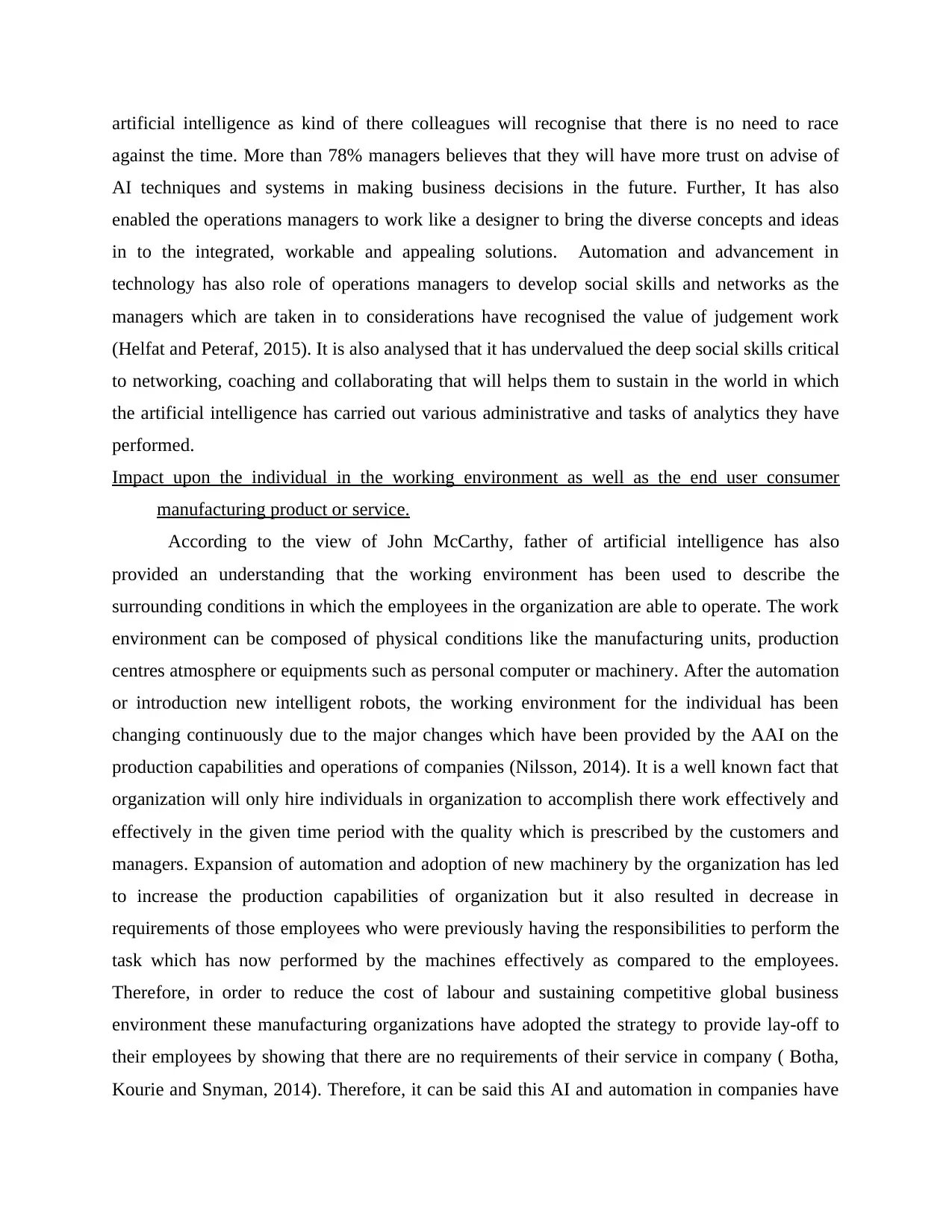
artificial intelligence as kind of there colleagues will recognise that there is no need to race
against the time. More than 78% managers believes that they will have more trust on advise of
AI techniques and systems in making business decisions in the future. Further, It has also
enabled the operations managers to work like a designer to bring the diverse concepts and ideas
in to the integrated, workable and appealing solutions. Automation and advancement in
technology has also role of operations managers to develop social skills and networks as the
managers which are taken in to considerations have recognised the value of judgement work
(Helfat and Peteraf, 2015). It is also analysed that it has undervalued the deep social skills critical
to networking, coaching and collaborating that will helps them to sustain in the world in which
the artificial intelligence has carried out various administrative and tasks of analytics they have
performed.
Impact upon the individual in the working environment as well as the end user consumer
manufacturing product or service.
According to the view of John McCarthy, father of artificial intelligence has also
provided an understanding that the working environment has been used to describe the
surrounding conditions in which the employees in the organization are able to operate. The work
environment can be composed of physical conditions like the manufacturing units, production
centres atmosphere or equipments such as personal computer or machinery. After the automation
or introduction new intelligent robots, the working environment for the individual has been
changing continuously due to the major changes which have been provided by the AAI on the
production capabilities and operations of companies (Nilsson, 2014). It is a well known fact that
organization will only hire individuals in organization to accomplish there work effectively and
effectively in the given time period with the quality which is prescribed by the customers and
managers. Expansion of automation and adoption of new machinery by the organization has led
to increase the production capabilities of organization but it also resulted in decrease in
requirements of those employees who were previously having the responsibilities to perform the
task which has now performed by the machines effectively as compared to the employees.
Therefore, in order to reduce the cost of labour and sustaining competitive global business
environment these manufacturing organizations have adopted the strategy to provide lay-off to
their employees by showing that there are no requirements of their service in company ( Botha,
Kourie and Snyman, 2014). Therefore, it can be said this AI and automation in companies have
against the time. More than 78% managers believes that they will have more trust on advise of
AI techniques and systems in making business decisions in the future. Further, It has also
enabled the operations managers to work like a designer to bring the diverse concepts and ideas
in to the integrated, workable and appealing solutions. Automation and advancement in
technology has also role of operations managers to develop social skills and networks as the
managers which are taken in to considerations have recognised the value of judgement work
(Helfat and Peteraf, 2015). It is also analysed that it has undervalued the deep social skills critical
to networking, coaching and collaborating that will helps them to sustain in the world in which
the artificial intelligence has carried out various administrative and tasks of analytics they have
performed.
Impact upon the individual in the working environment as well as the end user consumer
manufacturing product or service.
According to the view of John McCarthy, father of artificial intelligence has also
provided an understanding that the working environment has been used to describe the
surrounding conditions in which the employees in the organization are able to operate. The work
environment can be composed of physical conditions like the manufacturing units, production
centres atmosphere or equipments such as personal computer or machinery. After the automation
or introduction new intelligent robots, the working environment for the individual has been
changing continuously due to the major changes which have been provided by the AAI on the
production capabilities and operations of companies (Nilsson, 2014). It is a well known fact that
organization will only hire individuals in organization to accomplish there work effectively and
effectively in the given time period with the quality which is prescribed by the customers and
managers. Expansion of automation and adoption of new machinery by the organization has led
to increase the production capabilities of organization but it also resulted in decrease in
requirements of those employees who were previously having the responsibilities to perform the
task which has now performed by the machines effectively as compared to the employees.
Therefore, in order to reduce the cost of labour and sustaining competitive global business
environment these manufacturing organizations have adopted the strategy to provide lay-off to
their employees by showing that there are no requirements of their service in company ( Botha,
Kourie and Snyman, 2014). Therefore, it can be said this AI and automation in companies have
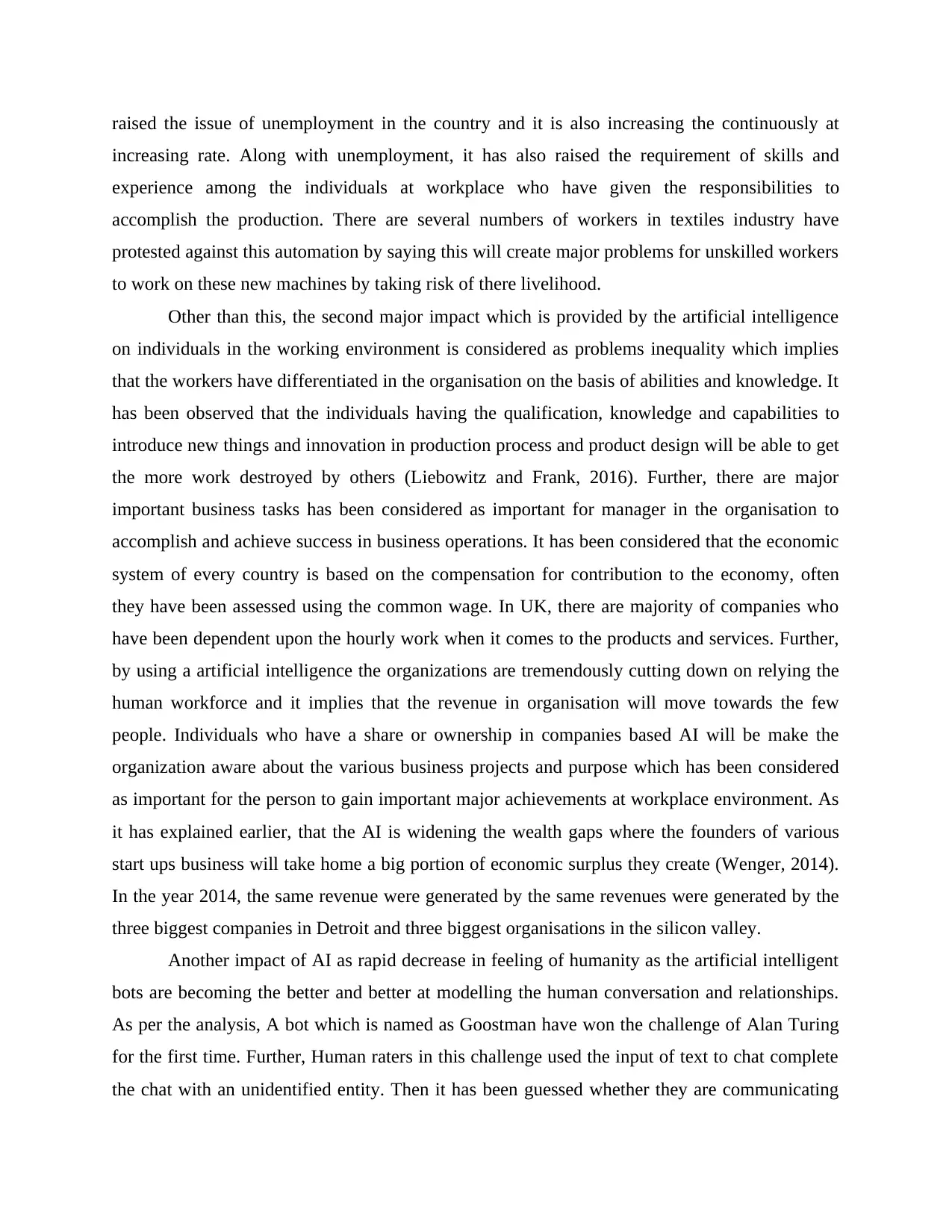
raised the issue of unemployment in the country and it is also increasing the continuously at
increasing rate. Along with unemployment, it has also raised the requirement of skills and
experience among the individuals at workplace who have given the responsibilities to
accomplish the production. There are several numbers of workers in textiles industry have
protested against this automation by saying this will create major problems for unskilled workers
to work on these new machines by taking risk of there livelihood.
Other than this, the second major impact which is provided by the artificial intelligence
on individuals in the working environment is considered as problems inequality which implies
that the workers have differentiated in the organisation on the basis of abilities and knowledge. It
has been observed that the individuals having the qualification, knowledge and capabilities to
introduce new things and innovation in production process and product design will be able to get
the more work destroyed by others (Liebowitz and Frank, 2016). Further, there are major
important business tasks has been considered as important for manager in the organisation to
accomplish and achieve success in business operations. It has been considered that the economic
system of every country is based on the compensation for contribution to the economy, often
they have been assessed using the common wage. In UK, there are majority of companies who
have been dependent upon the hourly work when it comes to the products and services. Further,
by using a artificial intelligence the organizations are tremendously cutting down on relying the
human workforce and it implies that the revenue in organisation will move towards the few
people. Individuals who have a share or ownership in companies based AI will be make the
organization aware about the various business projects and purpose which has been considered
as important for the person to gain important major achievements at workplace environment. As
it has explained earlier, that the AI is widening the wealth gaps where the founders of various
start ups business will take home a big portion of economic surplus they create (Wenger, 2014).
In the year 2014, the same revenue were generated by the same revenues were generated by the
three biggest companies in Detroit and three biggest organisations in the silicon valley.
Another impact of AI as rapid decrease in feeling of humanity as the artificial intelligent
bots are becoming the better and better at modelling the human conversation and relationships.
As per the analysis, A bot which is named as Goostman have won the challenge of Alan Turing
for the first time. Further, Human raters in this challenge used the input of text to chat complete
the chat with an unidentified entity. Then it has been guessed whether they are communicating
increasing rate. Along with unemployment, it has also raised the requirement of skills and
experience among the individuals at workplace who have given the responsibilities to
accomplish the production. There are several numbers of workers in textiles industry have
protested against this automation by saying this will create major problems for unskilled workers
to work on these new machines by taking risk of there livelihood.
Other than this, the second major impact which is provided by the artificial intelligence
on individuals in the working environment is considered as problems inequality which implies
that the workers have differentiated in the organisation on the basis of abilities and knowledge. It
has been observed that the individuals having the qualification, knowledge and capabilities to
introduce new things and innovation in production process and product design will be able to get
the more work destroyed by others (Liebowitz and Frank, 2016). Further, there are major
important business tasks has been considered as important for manager in the organisation to
accomplish and achieve success in business operations. It has been considered that the economic
system of every country is based on the compensation for contribution to the economy, often
they have been assessed using the common wage. In UK, there are majority of companies who
have been dependent upon the hourly work when it comes to the products and services. Further,
by using a artificial intelligence the organizations are tremendously cutting down on relying the
human workforce and it implies that the revenue in organisation will move towards the few
people. Individuals who have a share or ownership in companies based AI will be make the
organization aware about the various business projects and purpose which has been considered
as important for the person to gain important major achievements at workplace environment. As
it has explained earlier, that the AI is widening the wealth gaps where the founders of various
start ups business will take home a big portion of economic surplus they create (Wenger, 2014).
In the year 2014, the same revenue were generated by the same revenues were generated by the
three biggest companies in Detroit and three biggest organisations in the silicon valley.
Another impact of AI as rapid decrease in feeling of humanity as the artificial intelligent
bots are becoming the better and better at modelling the human conversation and relationships.
As per the analysis, A bot which is named as Goostman have won the challenge of Alan Turing
for the first time. Further, Human raters in this challenge used the input of text to chat complete
the chat with an unidentified entity. Then it has been guessed whether they are communicating
⊘ This is a preview!⊘
Do you want full access?
Subscribe today to unlock all pages.

Trusted by 1+ million students worldwide
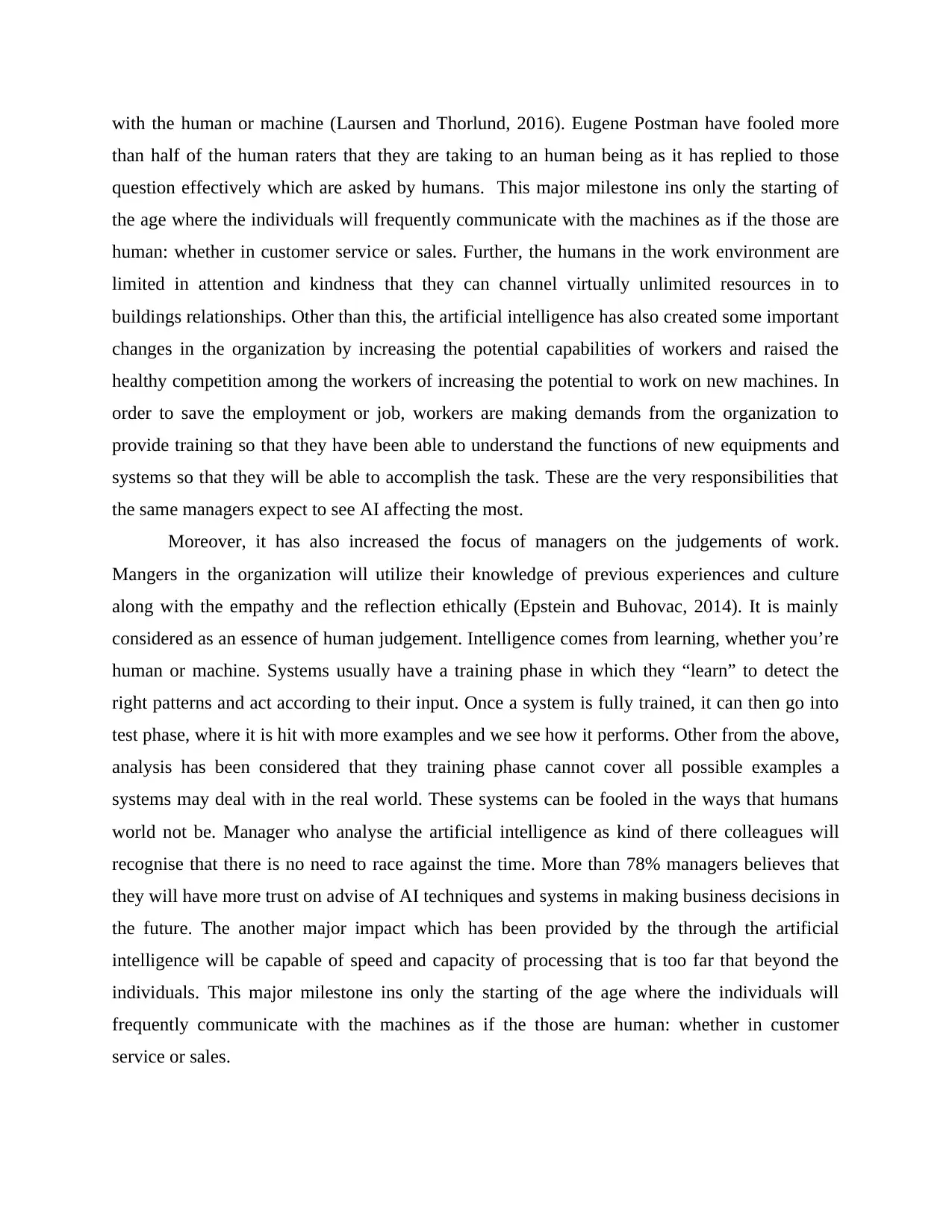
with the human or machine (Laursen and Thorlund, 2016). Eugene Postman have fooled more
than half of the human raters that they are taking to an human being as it has replied to those
question effectively which are asked by humans. This major milestone ins only the starting of
the age where the individuals will frequently communicate with the machines as if the those are
human: whether in customer service or sales. Further, the humans in the work environment are
limited in attention and kindness that they can channel virtually unlimited resources in to
buildings relationships. Other than this, the artificial intelligence has also created some important
changes in the organization by increasing the potential capabilities of workers and raised the
healthy competition among the workers of increasing the potential to work on new machines. In
order to save the employment or job, workers are making demands from the organization to
provide training so that they have been able to understand the functions of new equipments and
systems so that they will be able to accomplish the task. These are the very responsibilities that
the same managers expect to see AI affecting the most.
Moreover, it has also increased the focus of managers on the judgements of work.
Mangers in the organization will utilize their knowledge of previous experiences and culture
along with the empathy and the reflection ethically (Epstein and Buhovac, 2014). It is mainly
considered as an essence of human judgement. Intelligence comes from learning, whether you’re
human or machine. Systems usually have a training phase in which they “learn” to detect the
right patterns and act according to their input. Once a system is fully trained, it can then go into
test phase, where it is hit with more examples and we see how it performs. Other from the above,
analysis has been considered that they training phase cannot cover all possible examples a
systems may deal with in the real world. These systems can be fooled in the ways that humans
world not be. Manager who analyse the artificial intelligence as kind of there colleagues will
recognise that there is no need to race against the time. More than 78% managers believes that
they will have more trust on advise of AI techniques and systems in making business decisions in
the future. The another major impact which has been provided by the through the artificial
intelligence will be capable of speed and capacity of processing that is too far that beyond the
individuals. This major milestone ins only the starting of the age where the individuals will
frequently communicate with the machines as if the those are human: whether in customer
service or sales.
than half of the human raters that they are taking to an human being as it has replied to those
question effectively which are asked by humans. This major milestone ins only the starting of
the age where the individuals will frequently communicate with the machines as if the those are
human: whether in customer service or sales. Further, the humans in the work environment are
limited in attention and kindness that they can channel virtually unlimited resources in to
buildings relationships. Other than this, the artificial intelligence has also created some important
changes in the organization by increasing the potential capabilities of workers and raised the
healthy competition among the workers of increasing the potential to work on new machines. In
order to save the employment or job, workers are making demands from the organization to
provide training so that they have been able to understand the functions of new equipments and
systems so that they will be able to accomplish the task. These are the very responsibilities that
the same managers expect to see AI affecting the most.
Moreover, it has also increased the focus of managers on the judgements of work.
Mangers in the organization will utilize their knowledge of previous experiences and culture
along with the empathy and the reflection ethically (Epstein and Buhovac, 2014). It is mainly
considered as an essence of human judgement. Intelligence comes from learning, whether you’re
human or machine. Systems usually have a training phase in which they “learn” to detect the
right patterns and act according to their input. Once a system is fully trained, it can then go into
test phase, where it is hit with more examples and we see how it performs. Other from the above,
analysis has been considered that they training phase cannot cover all possible examples a
systems may deal with in the real world. These systems can be fooled in the ways that humans
world not be. Manager who analyse the artificial intelligence as kind of there colleagues will
recognise that there is no need to race against the time. More than 78% managers believes that
they will have more trust on advise of AI techniques and systems in making business decisions in
the future. The another major impact which has been provided by the through the artificial
intelligence will be capable of speed and capacity of processing that is too far that beyond the
individuals. This major milestone ins only the starting of the age where the individuals will
frequently communicate with the machines as if the those are human: whether in customer
service or sales.
Paraphrase This Document
Need a fresh take? Get an instant paraphrase of this document with our AI Paraphraser
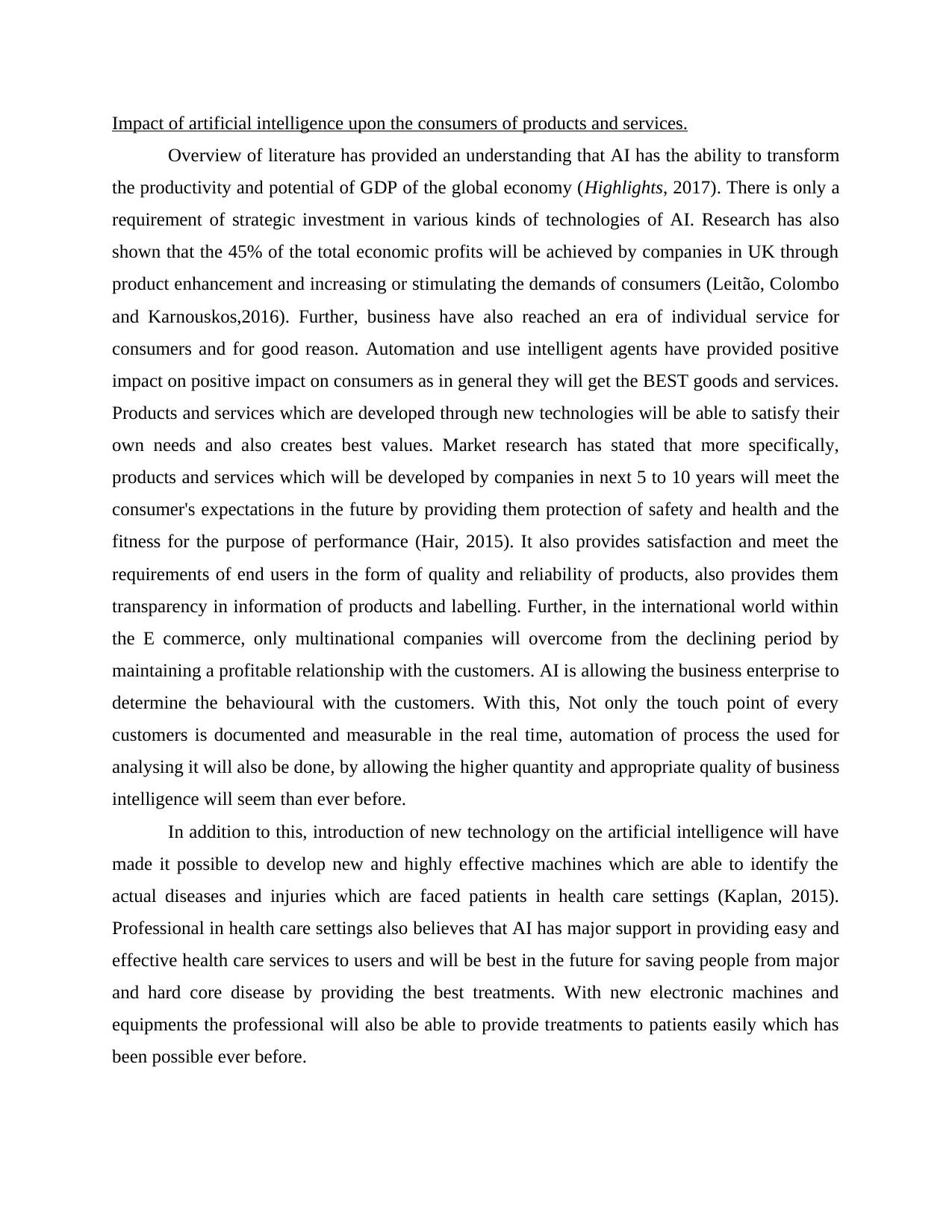
Impact of artificial intelligence upon the consumers of products and services.
Overview of literature has provided an understanding that AI has the ability to transform
the productivity and potential of GDP of the global economy (Highlights, 2017). There is only a
requirement of strategic investment in various kinds of technologies of AI. Research has also
shown that the 45% of the total economic profits will be achieved by companies in UK through
product enhancement and increasing or stimulating the demands of consumers (Leitão, Colombo
and Karnouskos,2016). Further, business have also reached an era of individual service for
consumers and for good reason. Automation and use intelligent agents have provided positive
impact on positive impact on consumers as in general they will get the BEST goods and services.
Products and services which are developed through new technologies will be able to satisfy their
own needs and also creates best values. Market research has stated that more specifically,
products and services which will be developed by companies in next 5 to 10 years will meet the
consumer's expectations in the future by providing them protection of safety and health and the
fitness for the purpose of performance (Hair, 2015). It also provides satisfaction and meet the
requirements of end users in the form of quality and reliability of products, also provides them
transparency in information of products and labelling. Further, in the international world within
the E commerce, only multinational companies will overcome from the declining period by
maintaining a profitable relationship with the customers. AI is allowing the business enterprise to
determine the behavioural with the customers. With this, Not only the touch point of every
customers is documented and measurable in the real time, automation of process the used for
analysing it will also be done, by allowing the higher quantity and appropriate quality of business
intelligence will seem than ever before.
In addition to this, introduction of new technology on the artificial intelligence will have
made it possible to develop new and highly effective machines which are able to identify the
actual diseases and injuries which are faced patients in health care settings (Kaplan, 2015).
Professional in health care settings also believes that AI has major support in providing easy and
effective health care services to users and will be best in the future for saving people from major
and hard core disease by providing the best treatments. With new electronic machines and
equipments the professional will also be able to provide treatments to patients easily which has
been possible ever before.
Overview of literature has provided an understanding that AI has the ability to transform
the productivity and potential of GDP of the global economy (Highlights, 2017). There is only a
requirement of strategic investment in various kinds of technologies of AI. Research has also
shown that the 45% of the total economic profits will be achieved by companies in UK through
product enhancement and increasing or stimulating the demands of consumers (Leitão, Colombo
and Karnouskos,2016). Further, business have also reached an era of individual service for
consumers and for good reason. Automation and use intelligent agents have provided positive
impact on positive impact on consumers as in general they will get the BEST goods and services.
Products and services which are developed through new technologies will be able to satisfy their
own needs and also creates best values. Market research has stated that more specifically,
products and services which will be developed by companies in next 5 to 10 years will meet the
consumer's expectations in the future by providing them protection of safety and health and the
fitness for the purpose of performance (Hair, 2015). It also provides satisfaction and meet the
requirements of end users in the form of quality and reliability of products, also provides them
transparency in information of products and labelling. Further, in the international world within
the E commerce, only multinational companies will overcome from the declining period by
maintaining a profitable relationship with the customers. AI is allowing the business enterprise to
determine the behavioural with the customers. With this, Not only the touch point of every
customers is documented and measurable in the real time, automation of process the used for
analysing it will also be done, by allowing the higher quantity and appropriate quality of business
intelligence will seem than ever before.
In addition to this, introduction of new technology on the artificial intelligence will have
made it possible to develop new and highly effective machines which are able to identify the
actual diseases and injuries which are faced patients in health care settings (Kaplan, 2015).
Professional in health care settings also believes that AI has major support in providing easy and
effective health care services to users and will be best in the future for saving people from major
and hard core disease by providing the best treatments. With new electronic machines and
equipments the professional will also be able to provide treatments to patients easily which has
been possible ever before.
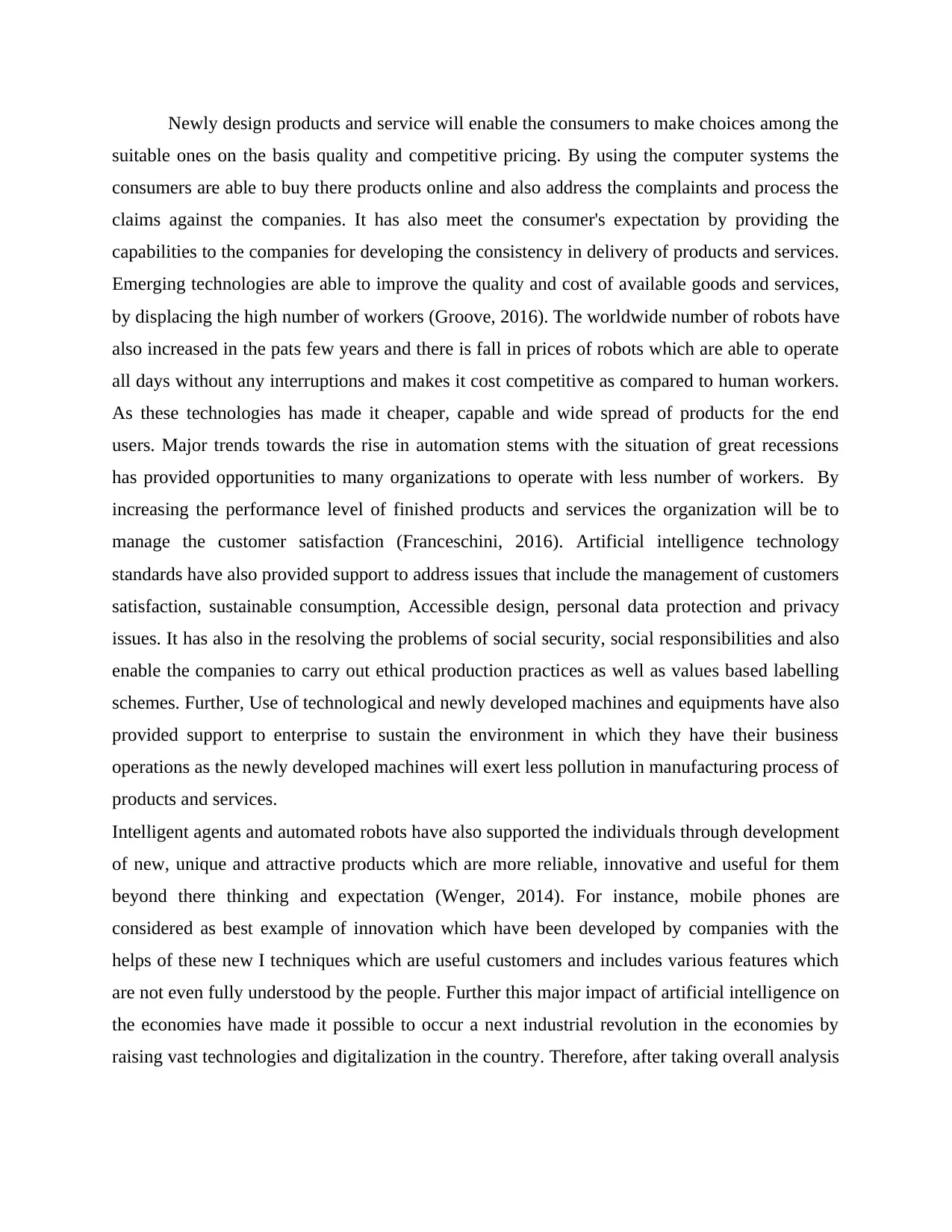
Newly design products and service will enable the consumers to make choices among the
suitable ones on the basis quality and competitive pricing. By using the computer systems the
consumers are able to buy there products online and also address the complaints and process the
claims against the companies. It has also meet the consumer's expectation by providing the
capabilities to the companies for developing the consistency in delivery of products and services.
Emerging technologies are able to improve the quality and cost of available goods and services,
by displacing the high number of workers (Groove, 2016). The worldwide number of robots have
also increased in the pats few years and there is fall in prices of robots which are able to operate
all days without any interruptions and makes it cost competitive as compared to human workers.
As these technologies has made it cheaper, capable and wide spread of products for the end
users. Major trends towards the rise in automation stems with the situation of great recessions
has provided opportunities to many organizations to operate with less number of workers. By
increasing the performance level of finished products and services the organization will be to
manage the customer satisfaction (Franceschini, 2016). Artificial intelligence technology
standards have also provided support to address issues that include the management of customers
satisfaction, sustainable consumption, Accessible design, personal data protection and privacy
issues. It has also in the resolving the problems of social security, social responsibilities and also
enable the companies to carry out ethical production practices as well as values based labelling
schemes. Further, Use of technological and newly developed machines and equipments have also
provided support to enterprise to sustain the environment in which they have their business
operations as the newly developed machines will exert less pollution in manufacturing process of
products and services.
Intelligent agents and automated robots have also supported the individuals through development
of new, unique and attractive products which are more reliable, innovative and useful for them
beyond there thinking and expectation (Wenger, 2014). For instance, mobile phones are
considered as best example of innovation which have been developed by companies with the
helps of these new I techniques which are useful customers and includes various features which
are not even fully understood by the people. Further this major impact of artificial intelligence on
the economies have made it possible to occur a next industrial revolution in the economies by
raising vast technologies and digitalization in the country. Therefore, after taking overall analysis
suitable ones on the basis quality and competitive pricing. By using the computer systems the
consumers are able to buy there products online and also address the complaints and process the
claims against the companies. It has also meet the consumer's expectation by providing the
capabilities to the companies for developing the consistency in delivery of products and services.
Emerging technologies are able to improve the quality and cost of available goods and services,
by displacing the high number of workers (Groove, 2016). The worldwide number of robots have
also increased in the pats few years and there is fall in prices of robots which are able to operate
all days without any interruptions and makes it cost competitive as compared to human workers.
As these technologies has made it cheaper, capable and wide spread of products for the end
users. Major trends towards the rise in automation stems with the situation of great recessions
has provided opportunities to many organizations to operate with less number of workers. By
increasing the performance level of finished products and services the organization will be to
manage the customer satisfaction (Franceschini, 2016). Artificial intelligence technology
standards have also provided support to address issues that include the management of customers
satisfaction, sustainable consumption, Accessible design, personal data protection and privacy
issues. It has also in the resolving the problems of social security, social responsibilities and also
enable the companies to carry out ethical production practices as well as values based labelling
schemes. Further, Use of technological and newly developed machines and equipments have also
provided support to enterprise to sustain the environment in which they have their business
operations as the newly developed machines will exert less pollution in manufacturing process of
products and services.
Intelligent agents and automated robots have also supported the individuals through development
of new, unique and attractive products which are more reliable, innovative and useful for them
beyond there thinking and expectation (Wenger, 2014). For instance, mobile phones are
considered as best example of innovation which have been developed by companies with the
helps of these new I techniques which are useful customers and includes various features which
are not even fully understood by the people. Further this major impact of artificial intelligence on
the economies have made it possible to occur a next industrial revolution in the economies by
raising vast technologies and digitalization in the country. Therefore, after taking overall analysis
⊘ This is a preview!⊘
Do you want full access?
Subscribe today to unlock all pages.

Trusted by 1+ million students worldwide
1 out of 14
Related Documents
Your All-in-One AI-Powered Toolkit for Academic Success.
+13062052269
info@desklib.com
Available 24*7 on WhatsApp / Email
![[object Object]](/_next/static/media/star-bottom.7253800d.svg)
Unlock your academic potential
Copyright © 2020–2026 A2Z Services. All Rights Reserved. Developed and managed by ZUCOL.




